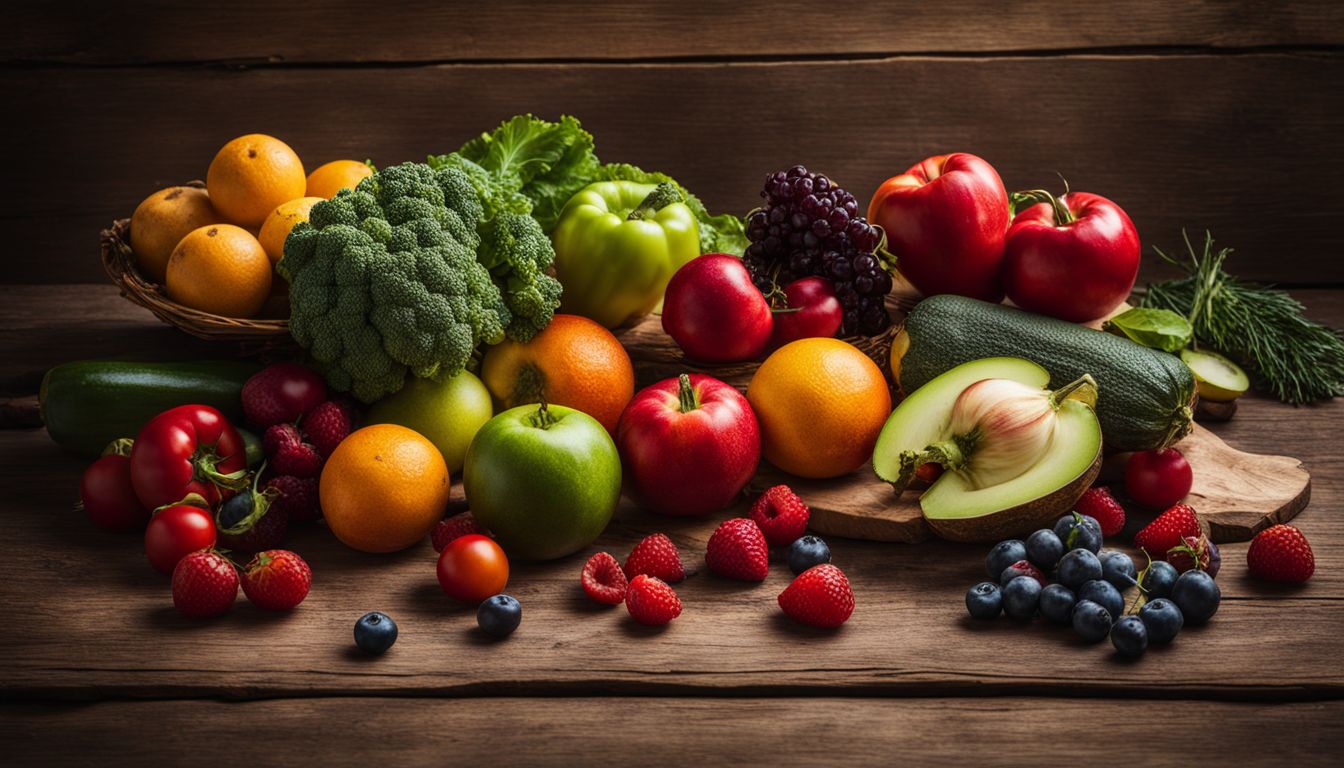
Finding solutions for hair falling out can feel overwhelming. It’s a common problem affecting both men and women due to various reasons. This post will guide you through simple and effective ways to prevent hair loss, from your diet to daily care routines.
Stay with us for helpful tips!
Key Takeaways
- Eating a Mediterranean diet rich in vegetables, fruits, and healthy fats can reduce the risk of hair loss. Also, incorporating more protein and Vitamin A into your meals strengthens your hair roots and promotes healthy growth.
- Adding supplements like multivitamins containing essential nutrients for hair health, vitamin D to support follicle health, and biotin to prevent hair thinning is beneficial. Be sure to consult healthcare providers before starting any new supplements.
- Practice gentle hair care by washing regularly with mild shampoo, using coconut or olive oil for scalp nourishment, avoiding tight hairstyles that stress the follicles, and minimizing heat styling to keep your hair strong.
- Medical treatments like laser therapy that uses low – energy lasers can enhance hair volume significantly. Minoxidil is also effective in revitalizing shrunken follicles and promoting regrowth.
- Alternative prevention methods like scalp massages increase blood flow helping nutrient delivery to follicles; certain yoga poses improve circulation promoting healthier hair while reducing stress known to cause loss.
The Causes of Hair Loss
Many factors contribute to hair loss. Genetics plays a big role, especially in male and female pattern baldness. Hormonal changes can also cause your hair to thin or fall out. This is common during menopause or after childbirth due to shifts in the body’s estrogen levels.
Medical conditions like thyroid problems, alopecia areata (an autoimmune disease that attacks hair follicles), and scalp infections such as ringworm can lead to noticeable hair thinning or even complete baldness in certain areas.
Stress isn’t just hard on your mind; it affects your physical health, including your hair. High stress levels can push hair follicles into a resting phase, causing them not only to stop growing but also to shed more easily when washing or combing your hair.
Medications for cancer treatment like chemotherapy, heart issues, depression, and arthritis often have side effects that include hair loss too. Even pregnancy can trigger temporary shedding due to hormonal upheaval and nutrient demands of the developing baby putting pressure on the mother’s system.
Dietary Measures to Prevent Hair Loss

To prevent hair loss, focus on your diet. Incorporate foods that support healthy hair growth, such as those found in the Mediterranean Diet and those high in protein and Vitamin A.
Mediterranean Diet
Eating a Mediterranean diet helps reduce the risk of androgenic alopecia, also known as male or female pattern baldness. This diet includes plenty of raw vegetables, fresh herbs, fruits, nuts, whole grains, lean proteins like fish and poultry, and healthy fats found in olive oil.
These foods are rich in nutrients that support hair health.
The benefits come from antioxidants and phytochemicals found in this diet. They fight oxidative stress which can harm hair follicles on the scalp. Including more elements of the Mediterranean diet into daily eating habits can be a step forward in preventing hair loss while promoting overall well-being.
Increased Protein Intake
Eating more protein helps fight hair loss. Your hair needs it to grow strong and healthy. Foods like eggs, nuts, and fish are packed with protein that feeds your hair roots and keeps them from falling out.
It’s like giving your hair a shield against shedding.
Getting enough protein also fixes nutritional problems that cause you to lose hair. If you’re not getting enough of it, your hair might start thinning or develop bald patches. Make sure your meals have plenty of lean meats, beans, or dairy products every day to keep your hair thick and full.
Vitamin A
Vitamin A plays a crucial role in maintaining healthy hair growth. Your body needs this vitamin to produce an oil known as sebum, which moisturizes the scalp and helps keep hair healthy.
Foods rich in Vitamin A include spinach, sweet potatoes, and dairy products. Including these foods in your diet can lead to stronger, more vibrant hair.
The correct amount of Vitamin A is key as too much can contribute to hair loss. It’s essential to find a balance that supports hair health without going overboard. Consulting with a healthcare provider can help determine the right dose for your individual needs, ensuring you get all the benefits without any unwanted side effects.
Effective Supplements for Hair Loss Prevention

To prevent hair loss, consider incorporating effective supplements such as multivitamins, vitamin D, and biotin into your daily routine. Read more to discover how these supplements can help maintain healthy hair.
Multivitamin
Multivitamins are crucial for preventing hair loss and promoting healthy hair growth. They contain essential vitamins and minerals such as vitamin A, B, C, and D, iron, selenium, and zinc that support the hair growth process.
Vitamin A is particularly important for maintaining healthy hair growth. Additionally, vitamin D has been linked to nonscarring alopecia prevention. Biotin and saw palmetto help maintain hair quality and density while ginseng may stimulate hair growth.
Including a multivitamin in your daily routine can provide the necessary nutrients to promote strong and healthy hair.
Incorporating a multivitamin into your daily regimen can significantly contribute to preventing hair loss and encouraging vibrant hair growth. These supplements are packed with vital nutrients like vitamins A through D, iron, selenium, zinc which support the overall health of your locks.
Vitamin D
Moving on from the benefits of multivitamins, let’s delve into the role of Vitamin D in preventing hair loss. This essential vitamin is crucial for healthy hair growth and has a direct impact on hair follicle health.
Low levels of Vitamin D have been linked to hair thinning and loss, making it an important component in maintaining a full and luscious head of hair.
Vitamin D plays a significant role in creating new hair follicles and may help stimulate natural hair growth. In addition to this, studies have shown that consuming foods high in Vitamin D or taking supplements can aid in preventing hair loss.
Biotin
Biotin, also known as vitamin B7, is a crucial nutrient for maintaining healthy hair and nails. A deficiency in biotin can lead to hair loss and brittle nails. Including biotin supplements or multivitamins containing biotin in your daily routine may help improve hair growth and reduce hair shedding.
These supplements work by strengthening the hair follicles and promoting healthy hair growth. However, it’s important to note that taking biotin supplements should be done under the guidance of a healthcare professional due to potential side effects if taken improperly.
Incorporating foods rich in biotin, such as eggs, almonds, sweet potatoes, and spinach into your diet can also support overall hair health when taken alongside other measures targeted at preventing hair loss.
Saw Palmetto is a natural supplement that may help maintain hair quality and density. It can potentially aid in promoting hair growth by blocking the hormone dihydrotestosterone (DHT), which is linked to hair loss.
Some studies suggest that saw palmetto could be as effective as finasteride, a common medication for treating hair loss. However, it’s important to note that the efficacy of saw palmetto for preventing hair loss varies among individuals.
It should be used as part of a comprehensive approach to hair care and under professional guidance.
Ginseng
Next up, let’s explore the benefits of ginseng for maintaining healthy hair. Ginseng is a natural remedy that can help maintain the quality and density of your hair. Its properties have potential benefits for promoting hair growth and improving scalp health.
When used in combination with other essential vitamins and minerals, ginseng plays a role in preventing hair loss and encouraging new hair growth. By incorporating ginseng into your daily routine, you can promote hair regrowth while taking steps to prevent further loss.
Ginseng is an effective addition to any comprehensive approach to maintaining healthy hair; it is designed to enhance scalp health and promote strong, vibrant locks.
Hair Care Practices to Prevent Hair Loss
To prevent hair loss, adopt regular washing habits. Use natural oils such as coconut and olive oil for nourishment. When styling your hair, opt for gentle methods to avoid unnecessary stress on the follicles.
Additionally, minimizing over-processing is crucial in maintaining healthy hair. Read more about effective ways to care for your hair to prevent further loss.
Regular Washing
Regular washing with a mild shampoo helps protect against hair loss. Clean hair and scalp promote healthy hair growth by removing excess oil, dirt, and product buildup. Washing your hair every two to three days is generally recommended to maintain a clean scalp without stripping the hair of its natural oils.
Avoiding harsh shampoos that can cause dryness or irritation is crucial for maintaining healthy hair and preventing breakage.
To further enhance your understanding of proper hair care techniques, let’s explore the next topic in our discussion: “Use of Coconut and Olive Oil.”
Use of Coconut and Olive Oil
To maintain healthy hair, using coconut and olive oil can prove beneficial. Both oils are known for their moisturizing properties, helping to prevent hair damage and promoting better blood flow to the scalp.
Coconut oil contains lauric acid, which has antimicrobial and hydrating effects on the hair and scalp. Olive oil is rich in antioxidants and vitamins E and K, all of which contribute to strong, nourished hair.
Massaging a small amount of either oil into the scalp before washing can deeply condition your hair while enhancing overall hair health.
Gentle Styling
When it comes to preventing hair loss, gentle styling plays a crucial role. Avoid tight hairstyles like ponytails and braids that can cause tension and breakage. Instead, opt for loose styles or protective hairstyles that minimize stress on the scalp.
Additionally, limit the use of heat-styling tools such as straighteners and curling irons to prevent damage to the hair shafts. Using soft fabric hair ties can also reduce friction and prevent unnecessary pulling on the hair strands.
To maintain healthy hair growth, meticulously handle your tresses by avoiding harsh brushing or combing when they are wet, as this is when they are most fragile. Keeping these gentle styling practices in mind can contribute to healthier, stronger locks over time.
Avoiding Over-processing
Over-processing hair, including excessive heat styling and chemical treatments like perms and dyes, can lead to weakened hair shafts and eventually hair loss. Using gentle styling techniques, avoiding tight hairstyles that pull at the scalp, limiting the use of heat tools, and opting for natural hair dyes can help prevent over-processing.
Making these adjustments can bolster overall hair health and resilience while reducing the risk of unwanted breakage or thinning.
Additionally, using protective products such as heat protectants when using hot tools or deep-conditioning masks to counteract any potential damage from chemical processing could further promote healthy hair growth.
Medical Treatments and Medications for Hair Loss
Medical treatments and medications for hair loss include laser therapy, platelet-rich plasma, minoxidil, finasteride, and phenylephrine. These methods are aimed at stimulating hair growth and minimizing further loss.
Laser Therapy
Low-level laser therapy, also known as red light therapy or cold laser therapy, has shown promise in improving hair density and thickness. The treatment involves using low-energy lasers to stimulate hair follicles on the scalp, which can potentially lead to new hair growth.
Research has found that this non-invasive method can significantly enhance hair volume in individuals with androgenetic alopecia, a common cause of hair loss. Additionally, studies have shown that platelet-rich plasma (PRP) treatments can also contribute to increased hair density when combined with low-level laser therapy.
Laser therapy provides a gentle and effective approach to promoting natural hair regrowth without the need for surgical interventions or medications. This non-pharmacological method may be suitable for individuals seeking alternative options for addressing hair loss concerns.
Platelet-rich Plasma
Platelet-rich plasma (PRP) therapy stimulates hair follicles and promotes new hair growth. This procedure involves drawing blood, separating the platelets, and then injecting the concentrated platelets into the scalp.
PRP therapy can be used in combination with other medical treatments for pattern baldness or hair thinning. Consulting a dermatologist before considering PRP therapy is crucial, as this treatment may not be suitable for everyone.
Overall, PRP therapy offers potential benefits in promoting natural hair regrowth.
Minoxidil
Minoxidil is a common medication used for hair loss treatment. It helps to promote new hair growth and reduce further hair loss. This topical solution has been widely used and proven effective in addressing male-pattern baldness and female-pattern hair loss.
When applied topically, minoxidil works by increasing blood flow to the scalp, which in turn revitalizes shrunken hair follicles and encourages regrowth. It is advisable for individuals seeking more than just hair maintenance.
Minoxidil not only stabilizes but also reverses the process of thinning hair, making it a robust solution for those looking to address receding hairlines or general thinning of the scalp.
Finasteride
Finasteride is a medication used to treat hair loss. It works by decreasing the hormone dihydrotestosterone (DHT), which contributes to male-pattern baldness. This drug can be taken orally, and it’s important to note that pregnant individuals should avoid handling finasteride as it may cause harm to an unborn baby.
Platforms like Roman and Hims provide online access for purchasing finasteride, making it convenient for those seeking treatment for hair loss.
Phenylephrine
Phenylephrine is a decongestant commonly used to relieve nasal discomfort associated with allergies, colds, or sinus issues. It works by narrowing the blood vessels in the nasal passages to reduce swelling and congestion.
However, it’s essential to note that topical phenylephrine is not publicly available. When using any medication containing phenylephrine, it’s crucial to follow the instructions from healthcare professionals and be mindful of potential side effects.
Phenylephrine
Other Methods of Prevention
Scalp massage, essential oils, and yoga are alternative methods for preventing hair loss. They provide unique ways to promote hair growth and scalp health.
Essential Oils
Essential oils, such as chamomile, thyme, and tea tree oils, have been found to reduce hair loss. Other essential oils like lavender, lemongrass, and peppermint can also be used in preventing hair loss.
Certain essential oils—pumpkin seed oil, rosemary oil, jojoba oil, lavender oil, peppermint oil, and tea tree oil—may help prevent hair loss while boosting hair growth.
Onion Juice
Onion juice is a potential helper in the fight against hair loss and can aid hair growth. It boasts sulfur, an essential component for maintaining healthy hair. By directly applying onion juice to the scalp and leaving it on for 15-30 minutes before washing it off, individuals may benefit from improved blood circulation to their hair follicles, promoting better hair growth.
Scalp Massage
Scalp massage is a simple yet effective method to stimulate hair growth and boost hair density. This practice increases blood circulation to the scalp, delivering essential nutrients and oxygen to the hair follicles.
Regular scalp massage also helps in relaxing the scalp muscles, reducing stress, and promoting an optimal environment for healthy hair growth. Furthermore, it can aid in distributing natural oils throughout the scalp, keeping the hair moisturized and nourished.
Incorporating a daily routine of gentle scalp massage into your hair care regimen can contribute significantly to maintaining strong, vibrant hair. It’s an accessible and natural way to improve overall scalp health and encourage robust hair growth without resorting to invasive or costly treatments.
Yoga
After addressing the benefits of scalp massage for hair health, it’s essential to explore the positive impact of yoga in preventing hair loss. Yoga techniques can significantly reduce stress and promote relaxation, ultimately contributing to improved overall hair health.
Certain yoga poses, such as downward-facing dog and headstands, may help increase blood circulation to the scalp and stimulate hair growth. Additionally, regular practice of yoga can improve hormonal balance, a factor that plays a crucial role in preventing hair loss.
Furthermore, meditation and deep breathing techniques utilized in yoga can effectively lower stress and anxiety levels – both known contributors to hair loss. Finally, establishing a consistent yoga routine is linked with improved sleep quality; this high-quality rest is vital for overall health and has an indirect influence on healthy hair growth.

Conclusion
To prevent hair loss, focus on a balanced diet rich in protein and vitamins. Implementing good hair care practices, such as regular washing and gentle styling, can also help. Consider using effective supplements like multivitamins and biotin to support overall hair health.
Medical treatments such as laser therapy and platelet-rich plasma can also aid in preventing hair loss. Additionally, exploring alternative methods like essential oils and scalp massage may contribute to maintaining healthy hair growth.
FAQs
1. What causes hair loss on the scalp?
Hair loss on the scalp can happen due to many reasons like stress, hormone changes, certain hairstyles that pull hard on your hair, and health conditions such as cicatricial alopecia or telogen effluvium.
2. Can changing my diet help prevent hair loss?
Yes! Eating a healthy diet rich in vitamins can support your hair cycle and strengthen your hair. Foods high in Vitamin H (also known as Biotin) are especially good for making your hair strong.
3. Are there any treatments available for balding or thinning hair?
For those experiencing balding or thinning of their hair, options include over-the-counter treatments like minoxidil (Rogaine), prescription medications, hormone replacement therapy for women, or procedures like hair transplants and follicular unit extraction.
4. How does hairstyling affect my risk of losing more hair?
Tight hairstyles such as cornrows or using harsh chemicals from bleaching and straighteners can lead to traction alopecia—a type of scarring that results in permanent loss of hair if not addressed early.
5. Will stopping smoking improve my chances against losing more strands of my precious locks?
Absolutely! Smoking has been linked to poor circulation which affects how well nutrients reach your follicles—the tiny pores where each strand grows from. Nonsmokers often have healthier scalps which support stronger and fuller heads of hairs compared to smokers.
6. Can protecting my scalp from the sun reduce the risk of further damage leading to potential loss?
Yes indeed! Just like skin elsewhere on our bodies needs protection from ultraviolet rays, so does our scalp—especially if it’s exposed due to thinning areas or bald spots.
